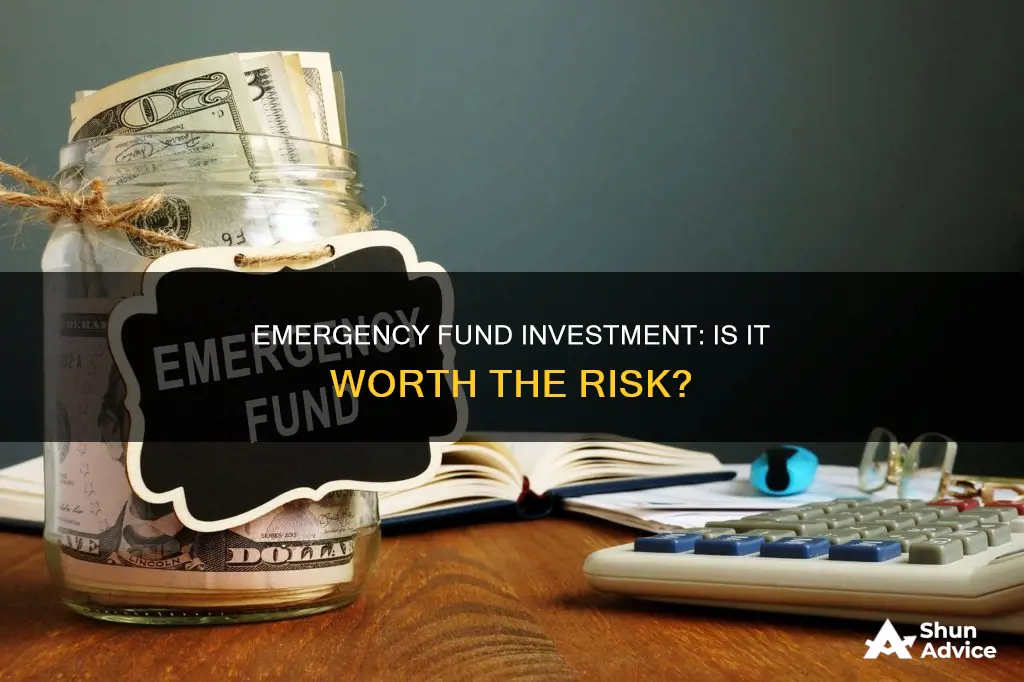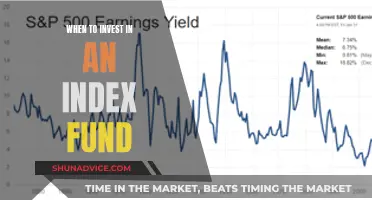
Investing your emergency fund can be tempting, especially when you consider the growth potential of your emergency money. However, it's generally not a good idea to do so because of the risk of losing your initial investment if the value of your assets falls. An emergency fund is meant to be easily accessible and to provide peace of mind during unexpected financial situations. Therefore, it's recommended to keep your emergency fund in a savings account, money market account, or certificate of deposit (CD), which offer liquidity and the opportunity to earn interest.
| Characteristics | Values |
|---|---|
| Should you invest your emergency fund? | No |
| Why? | You could lose money, you might not be able to access your money quickly, you might have to pay taxes and penalties, and you could sacrifice liquidity. |
| Where should you keep your emergency fund? | High-yield savings account, money market account, certificate of deposit (CD), or a checking account. |
What You'll Learn

Liquidity and accessibility
Financial experts generally advise against investing your emergency fund in stocks or other high-risk investments. This is because you could lose money, and you may not be able to access your funds immediately. For example, if you invest in real estate, it can take time to sell the property and access the cash. Similarly, if you need to sell your stocks to pay for an emergency expense, you may be forced to sell at a loss.
Instead, financial advisors recommend keeping your emergency fund in a checking or savings account. This way, you can pay for an emergency expense immediately. However, there are some ways to invest your emergency fund so that it can earn returns while still maintaining liquidity and accessibility.
- Money market accounts: These are interest-bearing accounts offered by banks or credit unions that combine features of checking and savings accounts. They are considered low-risk and typically provide annual percentage yields (APYs) of around 3-4%. Many money market accounts are insured by the Federal Deposit Insurance Corporation (FDIC) or National Credit Union Association (NCUA), protecting your money up to $250,000 per account. Some money market accounts also come with debit cards or check-writing privileges, giving you instant access to your funds.
- High-yield savings accounts: These accounts, often offered by online banks, provide higher interest rates than traditional savings accounts, typically between 3-4%. The money in these accounts is also typically FDIC-insured, and you can usually access your funds through online or telephone transfers or by requesting a check. However, with online-only accounts, you cannot access your funds at a branch location, and some methods of accessing your money may take several days.
- Certificates of Deposit (CDs): CDs can offer higher interest rates than checking or savings accounts, and they are FDIC-insured for up to $250,000 per account. However, one drawback is that you usually have to pay a penalty for withdrawing your money before the CD matures, making it less liquid and accessible. To increase liquidity and avoid early withdrawal penalties, you can create a CD ladder by purchasing multiple smaller CDs with different maturity dates. Some banks also offer no-penalty CDs that allow you to withdraw your money without sacrificing any earned interest, although the interest rate may be lower.
While investing your emergency fund can provide the benefit of earning returns, it's crucial to prioritize liquidity and accessibility. This ensures that you can easily access your funds when unexpected expenses arise.
Index Funds: NerdWallet's Guide to Smart Investing
You may want to see also

Risk of losing money
Investing your emergency fund can be risky because of the volatility of the market. If you invest your emergency fund, you run the risk of losing your initial investment if the value of your assets falls. This means you could wind up having less money to cover a surprise expense.
For example, if you put $5,000 into a savings account, you'll still have $5,000 in the account a few months later. However, if you put the same amount into a brokerage account and invest in stocks or index funds, it could be worth $4,000, or even less, if your investments lose value.
Financial advisors generally recommend keeping at least three to six months' worth of expenses in cash in highly liquid assets so that you can use them in an emergency.
If you invest your emergency fund, you run the risk of losing your initial investment if the value of your assets falls. This means you could end up with less money than you started with, which defeats the purpose of having an emergency fund.
Difficulty Accessing Your Money
If you invest your emergency fund in certain types of assets, such as real estate or retirement accounts, it may be difficult to access your money when you need it. For example, it can take time to sell a property, and with a retirement account, it could take several weeks to receive your money.
Potential for Investment Losses
All investments carry some level of risk, and there is always the potential for investment losses. If you invest your emergency fund and your investments don't perform as expected, you could lose a large portion of your savings quickly.
Tax Consequences
When you invest money into a taxable brokerage account, you'll be responsible for paying taxes when you sell shares and realize your gains. In the case of an emergency, you may have to sell assets that you've held for less than a year, which will result in a higher tax rate than if you had held them for the long term.
In summary, investing your emergency fund can be risky due to the potential for losing money, difficulty accessing funds, investment losses, and tax consequences. It's generally recommended to keep your emergency fund in a high-yield savings account or other liquid assets that are easily accessible and preserve your initial investment.
A Guide to Investing in Funding Societies
You may want to see also

Tax consequences
Investing your emergency fund in a taxable brokerage account means you will be responsible for paying taxes when you sell shares and realise your gains. The tax rate you pay will depend on when you bought the shares and when you sold them.
If you sell assets you have held for one year or less, you will pay a short-term capital gains tax, which is usually the same as your regular income tax rate. On the other hand, if you sell assets you have kept for over a year, you will pay a long-term capital gains tax, which is between 0% and 20%. Generally, it is better to be taxed at the long-term capital gains rate as you would typically owe less in taxes. However, emergencies are unpredictable, and you may be forced to sell your assets within a year of buying them, meaning you will owe more in taxes.
If you invest your emergency fund in a retirement account, like a 401(k) or IRA, and need to withdraw from it, you will likely trigger a 10% early withdrawal penalty, as well as a tax bill.
A Guide to Investing in Zack's Mutual Fund
You may want to see also

High-yield savings accounts
A high-yield savings account is a good place to store your emergency fund. It is federally insured up to $250,000 per depositor, per ownership category, per financial institution, so your money is safe. It also earns interest, and you can access your cash quickly when needed, whether through withdrawal or a funds transfer.
Some high-yield savings accounts are online-only, meaning you cannot access your funds at a branch location. Some methods of accessing emergency savings in an online-only account may take several days.
- SoFi Checking and Savings: 4.30% APY
- Forbright Bank Growth Savings: 5.00% APY
- Barclays Tiered Savings Account: 4.50% APY for balances under $250,000, 4.80% APY for balances over $250,000
- Capital One 360 Performance Savings: 4.10% APY
While a savings account is an excellent option, some people may not be able to open one immediately. If a bank closed one of your accounts in the past, it may have reported the closure to a consumer reporting agency, such as ChexSystems. That can prevent a new bank from approving your account application. If this is the case, you can work with the agency to resolve the outstanding issues and, in the meantime, consider opening a second chance checking account.
Exchange-Traded Funds: A Beginner's Guide to Smart Investing
You may want to see also

Money market accounts
Most money market accounts are insured by the Federal Deposit Insurance Corporation (FDIC) or National Credit Union Association (NCUA), which means your money will be protected up to $250,000 per account.
Some banks offer money market accounts that come with debit card and/or check-writing privileges, which gives you instant access to your funds. You often can make a certain number of free withdrawals per month as well.
The best money market accounts have strong rates that can help increase your savings funds. The money market account national average APY is at 0.43% as of 14 October 2024, according to Bankrate's most recent survey of banks. Top money market account yields are more than 11 times the national average.
- Vio Bank Cornerstone Money Market Account: 5.05% APY on all balances, $100 minimum deposit, no monthly fee
- Quontic Money Market Account: 5.00% APY on all balances, $100 minimum deposit, no monthly fee, comes with a debit card
- Sallie Mae Money Market Account: 4.20% APY on any balance, no minimum balance requirement, no monthly fee, comes with check-writing privileges
- Ally Bank Money Market Account: 4.00% APY across all balance tiers, no monthly fee or minimum amount required to open an account, comes with a debit card and the ability to write cheques, 24/7 customer service
A Beginner's Guide to UAE Mutual Fund Investing
You may want to see also
Frequently asked questions
An emergency fund is a bank account with money set aside to pay for large, unexpected expenses such as unforeseen medical expenses or home-appliance repair or replacement.
It is recommended that you save enough to cover three to six months' worth of living expenses.
It is recommended that you put your emergency fund into a savings account with a high interest rate and easy access. A high-yield savings account is a good option as it is federally insured and lets your money earn interest.
Investing your emergency fund can be risky as you may lose money. If you invest in stocks and the market crashes, you could lose a large portion of your savings. You may also have to pay taxes when you withdraw money from a brokerage account.







